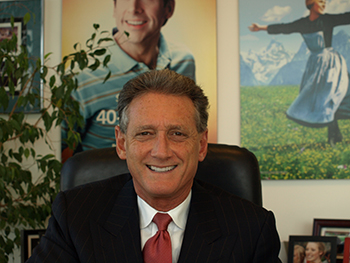
Steve Sauer
Nearly 20 years ago, talent manager and producer Steve Sauer was having a business lunch with Tony Thomopoulos, then-president of Amblin Television. Thomopoulos knew that Sauer’s parents were Holocaust survivors, so he asked Sauer if they had recorded their testimonies for Steven Spielberg’s Shoah Foundation yet.
They hadn’t, Sauer said, despite his many attempts to convince them to participate in the project. Thomopoulos asked Sauer for their phone number, which Sauer gave with “a little smirk and a little laugh,” he recalls – sure that whatever Thomopoulous had in mind would never work.
Later that afternoon, Sauer’s mother called him. Was he playing a joke on her? Someone claiming to be Steven Spielberg had just called and talked to her about how important it was that she give her testimony to the Shoah Foundation.
Floored, Sauer asked Thomopoulos if that had really been Steven Spielberg. Thomopoulos assured him that it was – Thomopolous had given him the phone number and Spielberg had made the call himself.
Though Sauer’s father still declined to be interviewed, Spielberg’s call was what finally convinced his mother, Jennie, to share her experiences. She recorded her testimony on Oct. 6, 1996, telling the story of how she survived the Holocaust in Poland by escaping from Kurowice concentration camp and hiding in the forest with a group of Jewish resistance fighters.
Sauer had the chance to work with USC Shoah Foundation for the first time since his mother’s interview when his client, Golden Globe-winning, Emmy and Academy Award nominated actor Steve Carell, served as the host of the 2015 Ambassadors for Humanity Gala in Detroit on Sept. 10.
Sauer said June Beallor, USC Shoah Foundation consultant and founding executive director, didn’t know his history with the Shoah Foundation when she called him to ask if Carell would be able to host the upcoming gala. But convincing Carell to participate turned out to be a very easy task.
“Steve, who knew my parents’ history, before I could even finish making the ask that he be part of this, immediately said yes,” Sauer said. “He said I think it’s important and I want to do it for the Shoah Foundation and I want to do it for Steven Spielberg, and I very much want to do it for your parents.”
The Sauers had strived to shield their children from the horrific experiences they had gone through, Sauer said, and had simply refused to talk about what happened to them during the Holocaust while he was growing up. In fact, his mother hid her Shoah Foundation interview tape in the house and instructed her family not to look for it or watch it until after she had passed away.
After she died, Sauer found the tape, and that Mother’s Day the whole family sat down to watch it together.
“There were a lot of tears in the room,” Sauer said. “It was unbelievable what she went though and the conditions she had to go through to survive.”
USC Shoah Foundation’s mission to record and preserve testimonies of genocide survivors is extremely important, Sauer said, because the testimonies serve as proof that these atrocities really did happen.
Sauer and Carell both felt the Ambassadors for Humanity gala was an inspiring event. They were impressed by Bill Ford, the evening’s honoree, and his company’s dedication to tolerance and social issues. Detroit and its revival was also thrilling to see. They felt a real sense of excitement and vigor from everyone they met over the two days they were in town, from the employees who led their tour of the Shinola factory to the staff of the Henry Ford Museum, where the gala was held.
“There’s just this energy and positiveness that was infectious beyond-beyond,” Sauer said. “Steve and I walked away saying ‘Wow! This is just great.’ It makes us really proud to be American. It was an extraordinary couple of days for us.”
[[nid:10354]]